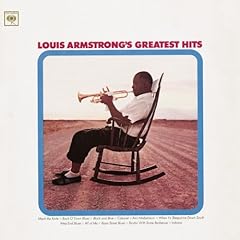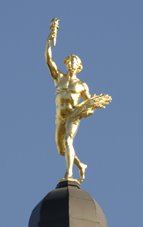 Louis Armstrong puts me in mind of Albert Einstein. Einstein wrote his theory of relativity when he was in his 20s, and he spent the rest of his life trying to figure out where to go next. Satchmo’s moment of glory lasted longer, a few decades, but by the time Hello Dolly! hit number 1 in 1964, he had done what he had to do, with nothing left of prove
Louis Armstrong puts me in mind of Albert Einstein. Einstein wrote his theory of relativity when he was in his 20s, and he spent the rest of his life trying to figure out where to go next. Satchmo’s moment of glory lasted longer, a few decades, but by the time Hello Dolly! hit number 1 in 1964, he had done what he had to do, with nothing left of proveEverything that you hear, if it’s jazz, and much of what isn’t jazz, owes its existence to Louis Armstrong; John Coltrane, Glenn Miller, Oscar Peterson, Wynton Marsalis, and on and on. Ok, so he basically invented the whole world of jazz improvisation. But more than that, as Dave Marsh says in his description of Wonderful World, “His use of his voice as a medium for emotional effects, damn the niceties, helped set the stage for a rock and soul generation that sometimes seemed to offer nothing but such displays.” I wouldn’t say ‘emotional displays” though; I would say “human heart.”
There are three collections here. The first was on a label of dubious legality, but the recordings seem legitimate enough; and it covered his music from the 1920s to the 1940s; the second was a prerecorded tape copy of Louis Armstrong’s Greatest Hits, featuring his Columbia recordings from the 50s; and the third was Louis Armstrong’s All Time Greatest Hits, which brings us into
 the 60s. All three were library copies, but the last was touch and go. I had it on hold for so long that my hold finally expired. I guess they’d lost the copy, but I guess they got a new one, because I did get my hands on it at some point.
the 60s. All three were library copies, but the last was touch and go. I had it on hold for so long that my hold finally expired. I guess they’d lost the copy, but I guess they got a new one, because I did get my hands on it at some point.Louis Armstrong:
• Cornet Chop Suey – Chop suey suggests food chopped into little pieces. And so it is, Satchmo plays his cornet and each note has its own nutritional value, and contains a universe of sound unto itself. The idea of infusing faux Chinese culture in to popular music forms would pop up now and then, think Ling Ting Tong by The Five Keys. This is from 1926. Recorded by Louis Armstrong & His Hot Five
• Potato Head Blues – No relation, one suspects, to Mr. Potato Head. From 1927, Louis Armstrong & His Hot Seven
• Tiger Rag – Louis Armstrong & His Orchestra from 1930. Recorded later by Les Paul & Mary Ford.
• Big Butter And Egg Man – The double entendres are flying fast and thick. By Louis Armstrong & His Hot Five from 1926, vocals by Louis Armstrong and May Alix.
• When It’s Sleepy Time Down South – Black musicians’ relationship with the south has always been something like a love-hate one. There is always more going on than the simple lyrics would have us believe. Louis Armstrong & His Orchestra from 1941. An actual singing vocal by Armstrong.
• When You’re Smiling – A very famous song by Charlie Chaplin. Only Satchmo could pull this off without sounding hokey. Louis Armstrong & His Orchestra from 1929
• On The Sunny Side Of The Street – From 1935, again Louis Armstrong & His Orchestra
• Solitude – Ditto.
• When The Saints Go Marching In – This probably started the tradition of performing this as a jazz / rock number. It is Louis Armstrong & His Orchestra and it is from 1938.
• Ain’t Misbehavin’ – Ditto again. This is the great Fats Waller song. I always liked Leon Redbone’s version.
• Jeepers Creepers – One of those songs that becomes part of the popular culture well beyond the significance of the immediate context. This is Louis Armstrong & His Orchestra from 1939.
• I Want A Little Girl – Not surprisingly, he is talking about a romantic partner, not a daughter. He is back to being Louis Armstrong & His Hot Seven. This is from 1946
• Someday You’ll Be Sorry – Louis Armstrong & His All Stars from 1947.
• Lazy River – A hit for Si Zentner in 1961, and Bobby Darin did it. This is The All Stars from 1948.
• I Love Jazz – From 1958.
• Mack The Knife (A Theme From The Threepenny Opera) – Unlike most of the contemporary versions, Satchmo sings it, and it was about 3 years before Bobby Darin got hold of it, but Darin owns it. From the winter of 1956
• Back O’ Town Blues
• Blueberry Hill – From the fall of ’56, more or less contemporary with Fats Domino’s version. Recorded, though, in 1950.
• (What Did I Do To Be So) Black And Blue – A rare song of racial awareness. Van Morrison covered this on Magic Time. This is odd coming from Louis Armstrong, whose statements tended to musical, not lyrical.
• Basin Street Blues
• Cabaret – The song from the play / movie.
• All Of Me – The best version of this song is probably by Dinah Washington.
• Struttin’ With Some Barbecue
• Indiana – A real jazz rave up. And well, no, I’ve never been to Indiana…
• That Lucky Old Sun – Some people have a hard life. I prefer Ray Charles’ version.
• I Still Get Jealous – Love songs tend to be about young love, new love, falling in love, infatuation. It’s rare to hear a song like this about an old married couple, and how they still have it for each other. I think also of Let’s Chase Each Other Round The Room Tonight by Merle Haggard – different style, same message.
• Hello, Dolly! – And so the guy who invented jazz back in the 20s was back at number 1 in the spring of 1964, competing with The Beatles, The Stones, The Animals, et al, with a song that was totally retrograde…
• What A Wonderful World – No relation to Wonderful World by Sam Cooke. This song was released in 1968 and reached number 1 on the UK charts; then, in 1988, after being featured prominently in Good Morning Vietnam, it found its way into the Billboard top 30. The song is a simple child’s view of the wonder of the world, and Satchmo’s gritty delivery keeps from being maudlin; on the contrary, his voice lends reality to the Hallmark lyrics.
• Muskrat Ramble – Made famous by The Andrews Sisters, the tune was borrowed by Country Joe McDonald for Feeling-Like-I’m-Fixing-To-Die Rag


No comments:
Post a Comment